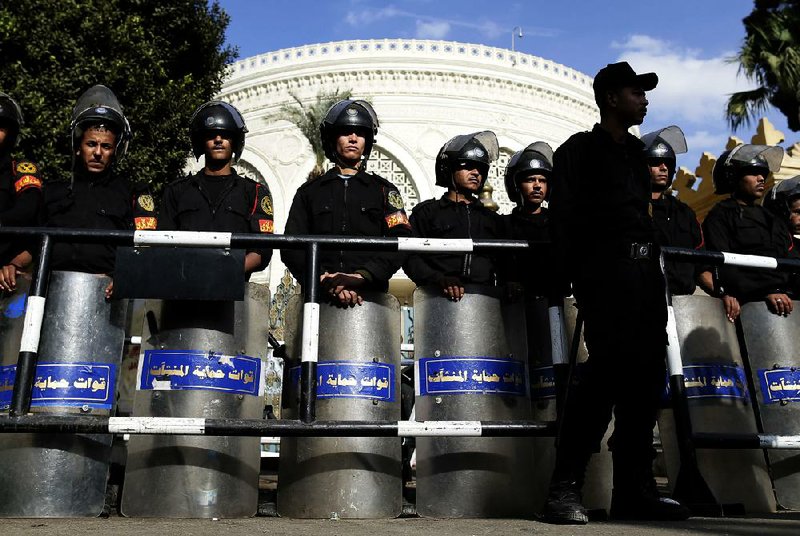CAIRO, Egypt — Struggling to subdue continuing street protests, the government of President Mohammed Morsi has approved legislation reimposing martial law by calling on the armed forces to keep order and authorizing soldiers to arrest civilians, Egypt’s state media reported Saturday.
INTERACTIVE
“President Morsi will soon issue a decision for the participation of the armed forces in the duties of maintaining security and protection of vital state institutions until the constitution is approved and legislative elections are finished,” Al Ahram reported.
Parliamentary elections are expected to be held two months after the constitutional referendum, which is scheduled for next Saturday.
Meanwhile, members of a presidential national dialogue committee recommended Saturday that the president rescind some powers he had given himself, but that the referendum go ahead as scheduled. Panel members said Morsi approved the recommendations.
A military spokesman read a statement over state television echoing the report of the president’s military order and calling for a dialogue to resolve the crisis. The mili- tary “realizes its national responsibility for maintaining the supreme interests of the nation and securing and protecting the vital targets, public institutions, and the interests of the innocent citizens,” the spokesman said.
Expressing “sorrow and concern” over recent developments, the military spokesman warned of “divisions that threaten the state of Egypt.”
“Dialogue is the best and sole way to reach consensus that achieves the interests of the nation and the citizens,” the spokesman said. “Anything other than that puts us in a dark tunnel with drastic consequences, which is something that we will not allow.”
Al Ahram reported that the defense minister would determine the scope of the military’s role. Military officers would be authorized to act as police and “to use force to the extent necessary to perform their duty,” the newspaper said.
A need to rely on the military to secure a referendum to approve the new charter could undermine Morsi’s efforts to present the documents as an expression of national consensus that might resolve the crisis.
After six decades during which military-backed secular autocrats used the threat of an Islamist takeover to justify authoritarian rule, the order would send the military into the streets to protect an elected Islamist, dashing the whispered hopes of some more secular Egyptians that the military might step in to remove Morsi.
Most of the remaining trust between the rival Islamist and secular factions began to break down with Morsi’s decree Nov. 22 granting himself powers above any judicial review until the ratification of a new constitution.
At the time, Morsi said he needed such unchecked power to protect against the threat that Mubarak-appointed judges might dissolve the constitutional assembly. He also tried to give the assembly a two-month extension on its year-end deadline to forge consensus between the Islamist majority and the secular faction — something liberals have sought.
Hundreds of thousands of protesters accusing Morsi and his Islamist allies of monopolizing power poured into the streets. At least six civilians were killed in the unrest, several offices of the Muslim Brotherhood were torched, and judges declared a national strike.
In response, Morsi’s Islamist allies in the assembly stayed up all night to rush out a draft constitution over the boycotts and objections of the secular minority and the Coptic Christian Church.
Then, worried that the Interior Ministry might fail to protect the presidential palace from sometimes-violent demonstrations outside, Morsi turned to the Muslim Brotherhood and other Islamist groups to defend it, resulting in the worst clashes between political factions since Gamal Abdel Nasser’s coup six decades ago.
In a speech last week, Morsi had invited secular opposition leaders to meet with him this weekend to try to work out a compromise, and his vice president suggested that the constitutional referendum could be delayed. But the principal leaders declined the invitation.
Without them, he met Saturday with a committee again dominated by fellow Islamists, including some less-conservative Islamists outside the Brotherhood’s party, according to a list reported on state media. Only one secular politician, the former presidential candidate Ayman Nour, attended.
Members of the committee recommended Saturday that the referendum on the constitution be held on schedule but that the president rescind some powers he had given himself.
Selim al-Awa, an Islamist at the committee meeting, said the panel recommended — and Morsi approved — removing articles that granted Morsi powers to declare emergency laws and shield him from judicial oversight.
If the constitution is rejected, a new constitutional committee would be seated within three months to draft a new constitution, al-Awa said.
Gamal Eid, a human-rights lawyer, said the recommendations to rescind some powers were a “play on words” since Morsi had already achieved the desired aim of finalizing the draft constitution and protecting it over the past weeks from a judicial challenge.
A sit-in by Morsi’s opponents around the palace continued Saturday, with protesters setting up roadblocks with tanks behind them amid reports that the president’s supporters planned rival protests. By midday Saturday, TV footage showed the military setting up a new wall of cement blocks around the palace.
Muslim Brotherhood leaders, meanwhile, made their highest profile appearances since the dispute began. The group’s top leader Mohammed Badie and his powerful deputy Khairat el-Shater held news conferences Saturday alleging there was a conspiracy to topple Morsi but presenting little proof.
Badie said the opposition has accused his group of violence but is instead responsible for the attacks on Muslim Brotherhood offices. He also claimed that most of those killed in last week’s violence at the palace and other governorates were members of the Brotherhood.
“These are crimes, not opposition or disagreement in opinion,” he said.
Information for this article was contributed by David D. Kirkpatrick of The New York Times; by Sarah El Deeb and staff members of The Associated Press; and by Zaid Sabah Abd Alhamid, Salma El Wardany and Glen Carey of Bloomberg News.
Front Section, Pages 1 on 12/09/2012

